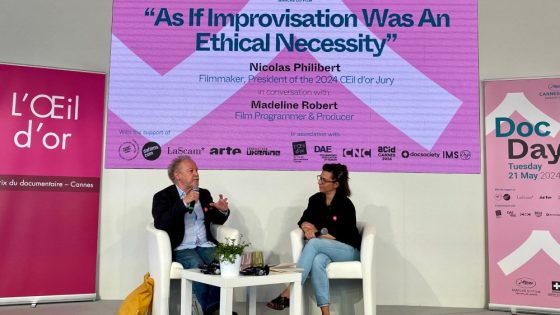Honoring an annual tradition, Nicolas Philibert, the head of this year’s Œil d’Or Jury, which rewards the best documentary at the Cannes Film Festival, opened up about his filmmaking process before an industry crowd on the final day of Cannes Docs, the Film Market sidebar dedicated to documentary film.
Hosted by France’s National Film Board (CNC) and moderated by film programmer and producer Madeline Robert, the conversation focused on the French director’s work in psychiatry, notably his recent trilogy, which started with the 2023 Golden Bear winner “On the Adamant.”
Shot on a floating day care centre in Paris for people suffering from mental disorders, “On the Adamant” follows a group of patients as they attend a variety of activities and share the stories of their lives with the filmmaker.
The next two films are “Averroès & Rosa Parks” and “The Typewriter and Other Headaches,” both released earlier this year. But, Philibert explained, the trilogy was not part of a plan. Rather, it unfolded organically.
“I improvise quite a lot. I avoid preparing too much to allow encounters to occur,” he said, adding that he had only planned to make a single feature film when he started filming on the Adamant, the name of the boat. “Then, because of the people I met there, I was moved to go further and make a tryptic. But nothing was planned: I really want to be free to let things happen in front of the camera.”
Curious about where some of the patients reside, Philibert filmed them in conversation with their doctors at their residential psychiatric units near Paris, Averroès & Rosa Parks, after which the trilogy’s second film is named.
His films, Philibert explained, “are built upon the relationship that emerges, and I try to create an atmosphere, a climate that builds confidence so that the people I’d like to film want to give me something.”
When asked about his interviews with the patients, Philibert rejected the term, calling them conversations instead. While he said that he “doesn’t push or dictate anything,” he insisted that he certainly doesn’t try to make his presence forgotten.
“I don’t prepare any questions. I’m not like a journalist. [But] I don’t make what the Anglo-Saxons call “fly on the wall” documentaries, where you try to make yourself as discreet as possible. You hear my voice; my presence is part of my films. That’s how I’m able to create a relationship between the people I film and the viewers. I’m not on the outside,” he said.
The ultimate goal being, he added, “to understand what the hell I am doing here.”
He sees the camera as a tool that enables him to go towards others, but one that needs to be handled with great care, not to instrumentalize the subjects’ suffering.
“On the Adamant” marked Philibert’s return to the world of psychiatry after his 1996 feature “Every Little Thing,” set in a psychiatric clinic near Paris.
After much hesitation – “Initially, I rejected the idea of bringing my camera into a place where people just want to be left alone” – he heeded suggestions to go and meet the caregivers and the patients. His desire to improve his understanding of the world through film prompted him to start shooting.
“I decided to do it to confront my own fears. I met the caregivers and the patients, who deeply moved me. They brought me a lot and made me question my biases and prejudice. They gave me a lot of food for thought,” he said.
The same appetite for understanding the world and his place within it is what made Philibert return to psychiatry with “On the Adamant” 25 years later.
“I am always searching for something,” he said. “The people you meet in the psychiatric wards give the impression of searching for meaning, and that’s why they are so stimulating: they push you beyond your boundaries, make you question yourself. I feel challenged as a filmmaker, so they push me to come back to this world.”
Asked whether he was planning on coming back, the 72-year-old director answered with humor, “Well, it is a trilogy, and I have done three films, but look at ‘The Three Musketeers’: were they really three?” he joked, referring to the famous Alexandre Dumas book, which tells the story of four musketeers in 17th-century France.
The talk kicked off a series of high-level panels and events that marked Doc Day, the closing day of Cannes Docs, which wrapped up on May 21.
Source Agencies


